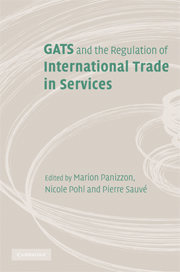Book contents
- Frontmatter
- Contents
- Contributors
- List of figures
- List of tables
- List of abbreviations
- Preface
- PART 1 Beyond regulatory control and multilateral flexibility: Gains from a cosmopolitan GATS
- PART 2 Unexplored economic, political and judicial dimensions of GATS
- PART 3 The limits of request–offer negotiations: Plurilateral and alternative approaches to services liberalisation
- PART 4 GATS case law: A first assessment
- 10 Lessons learned from litigating GATS disputes: Mexico – Telecoms
- 11 From Periodicals to Gambling: A review of systemic issues addressed by WTO adjudicatory bodies under the GATS
- 12 Specificities of WTO dispute settlement in services cases
- 13 Can foreign investors in services benefit from WTO dispute settlement? Legal standing and remedies in WTO and international arbitration
- PART 5 Market access, national treatment and domestic regulation
- PART 6 Unfinished business: Safeguard and subsidy disciplines for services
- PART 7 Challenges to the scope of GATS and cosmopolitan governance in services trade
- PART 8 Conclusion
- Index
- References
10 - Lessons learned from litigating GATS disputes: Mexico – Telecoms
from PART 4 - GATS case law: A first assessment
Published online by Cambridge University Press: 03 September 2009
- Frontmatter
- Contents
- Contributors
- List of figures
- List of tables
- List of abbreviations
- Preface
- PART 1 Beyond regulatory control and multilateral flexibility: Gains from a cosmopolitan GATS
- PART 2 Unexplored economic, political and judicial dimensions of GATS
- PART 3 The limits of request–offer negotiations: Plurilateral and alternative approaches to services liberalisation
- PART 4 GATS case law: A first assessment
- 10 Lessons learned from litigating GATS disputes: Mexico – Telecoms
- 11 From Periodicals to Gambling: A review of systemic issues addressed by WTO adjudicatory bodies under the GATS
- 12 Specificities of WTO dispute settlement in services cases
- 13 Can foreign investors in services benefit from WTO dispute settlement? Legal standing and remedies in WTO and international arbitration
- PART 5 Market access, national treatment and domestic regulation
- PART 6 Unfinished business: Safeguard and subsidy disciplines for services
- PART 7 Challenges to the scope of GATS and cosmopolitan governance in services trade
- PART 8 Conclusion
- Index
- References
Summary
The use by the United States of World Trade Organization (WTO) dispute settlement procedures to address Mexico's restrictions on international long distance telecommunications services was, in my view, a nearly unalloyed success. The United States took on Mexico's most powerful private stakeholder (Teléfonos de México), protected by a complex regulatory scheme in a technically complicated services sector, and showed that the WTO dispute settlement mechanism was up to the task. The parties were not able to resolve the matter through negotiation, and a panel proceeding ensued. But no appeal was deemed necessary, nor was Mexico's compliance challenged. The US Federal Communications Commission's international traffic statistics published in March 2006 indicated that the call volume from the United States to Mexico doubled between 2003 and 2004. It appears that much of that growth may have been driven by lower prices coming as a direct result of regulatory reform generated by the WTO case.
It was a great privilege to be one of the lawyers involved in the development and prosecution of the claims brought in that dispute. The case represents many ‘firsts’ – the first pure services dispute litigated in the WTO; the first dispute involving the interpretation of the ‘Reference Paper’ on basic telecommunications services; the first WTO dispute in which a panel applied WTO competition law. I describe below some of the lessons that I learned in the process that are not specific to the telecommunications sector.
- Type
- Chapter
- Information
- GATS and the Regulation of International Trade in ServicesWorld Trade Forum, pp. 225 - 235Publisher: Cambridge University PressPrint publication year: 2008
References
- 1
- Cited by



